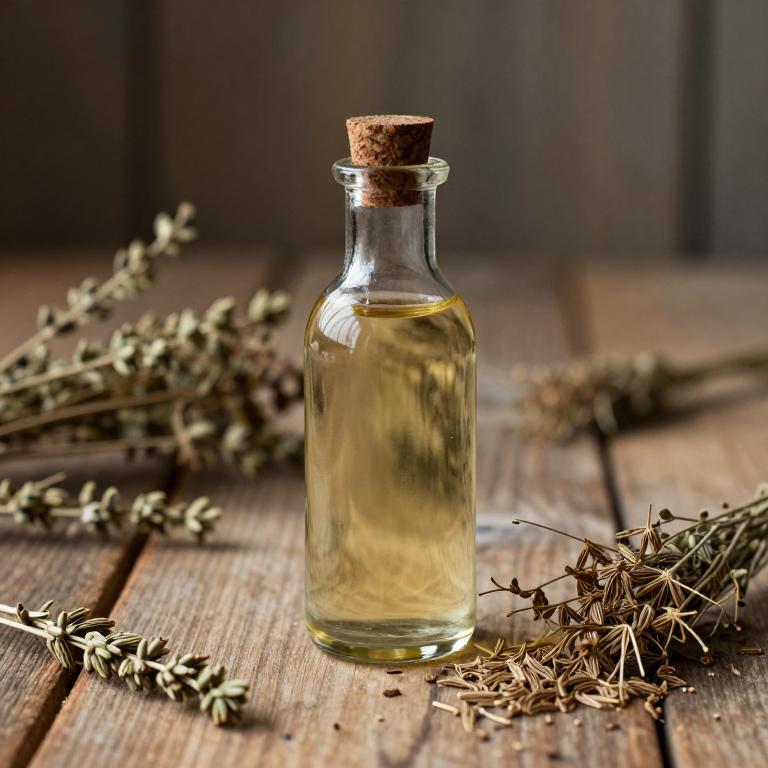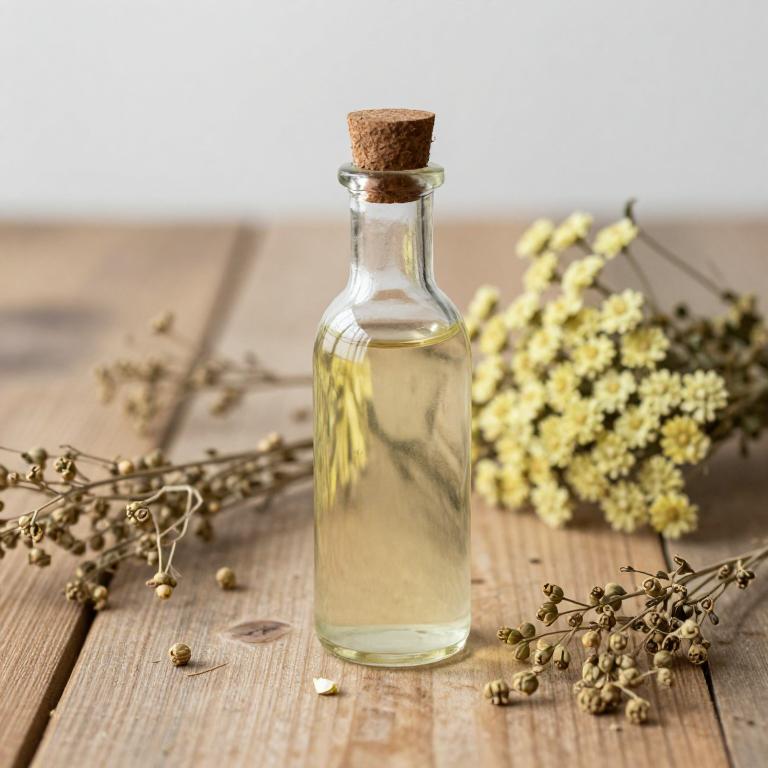10 Best Herbal Syrups For Flatulence

Herbal syrups for flatulence are natural remedies that aim to alleviate symptoms of excess gas and bloating by incorporating digestive-friendly herbs such as fennel, ginger, and peppermint.
These syrups are often made by steeping herbs in water or alcohol, then sweetening the resulting infusion with honey or sugar to create a palatable form. They work by relaxing the digestive tract, reducing gas buildup, and promoting smoother digestion. Many people find these syrups to be gentle alternatives to over-the-counter medications, especially for those preferring natural treatments.
However, it's important to consult a healthcare provider before use, especially for individuals with underlying health conditions or those taking other medications.
Table of Contents
1. Fennel (Foeniculum vulgare)

Foeniculum vulgare, commonly known as fennel, is often used in herbal syrups to help alleviate symptoms of flatulence.
The active compounds in fennel, such as anethole and flavonoids, possess carminative properties that help expel gas from the digestive tract. These syrups are typically prepared by infusing dried fennel seeds in a base of honey or sugar, making them easy to consume. They are especially popular in traditional medicine for their soothing effect on the gastrointestinal system.
Regular use of fennel syrup may reduce bloating and discomfort associated with excessive gas.
2. Cumin (Cuminum cyminum)

Cuminum cyminum, commonly known as cumin, is often used in herbal syrups to aid in the relief of flatulence due to its carminative properties.
These syrups are traditionally prepared by infusing cumin seeds in a base of honey or sugar, which enhances their potency and palatability. The essential oils in cumin, such as cuminaldehyde, help to stimulate digestion and reduce gas buildup in the gastrointestinal tract. Herbal syrups containing cumin are particularly beneficial for individuals experiencing bloating and discomfort from indigestion.
When used regularly, these syrups can provide a natural and effective remedy for managing flatulence and improving overall digestive health.
3. Caraway (Carum carvi)

Carum carvi, commonly known as caraway, is a herbal remedy often used in the form of syrup to alleviate symptoms of flatulence.
This traditional remedy works by relaxing the smooth muscles in the digestive tract, which helps to ease gas buildup and reduce bloating. Caraway syrup is typically made by steeping the dried seeds in alcohol or honey, allowing the active compounds to be extracted. It is especially popular in European herbal medicine for its gentle yet effective action on the gastrointestinal system.
When taken in moderation, carum carvi syrup can provide natural relief from gas and discomfort without the side effects associated with over-the-counter medications.
4. Ginger (Zingiber officinale)

Zingiber officinale, commonly known as ginger, has been traditionally used for its digestive benefits, including the relief of flatulence.
Ginger herbal syrups are often prepared by simmering fresh ginger root in sugar and water, creating a soothing and aromatic remedy. These syrups can help reduce gas and bloating by stimulating digestion and easing gastrointestinal discomfort. The active compounds in ginger, such as gingerol and shogaol, possess anti-inflammatory and carminative properties that support digestive health.
When consumed in moderation, ginger syrups can be a natural and effective aid for managing flatulence and promoting overall gut wellness.
5. Dog rose (Rosa canina)

Rosa canina, also known as dog rose, is a traditional herbal remedy that has been used for centuries to support digestive health.
Rosa canina herbal syrups are often formulated to help alleviate symptoms of flatulence by promoting healthy digestion and reducing gas buildup in the gastrointestinal tract. The fruit of the Rosa canina plant contains high levels of vitamin C, antioxidants, and dietary fiber, which may contribute to its digestive benefits. These syrups are typically made by extracting the dried fruit and combining it with natural sweeteners, making them a palatable option for daily use.
As a complementary therapy, Rosa canina syrups may help ease bloating and discomfort associated with excess gas, though they should be used in conjunction with a balanced diet and lifestyle.
6. Black pepper (Piper nigrum)

Piper nigrum, commonly known as black pepper, has been traditionally used in herbal syrups to aid in the relief of flatulence due to its digestive stimulating properties.
The active compound, piperine, enhances the absorption of other nutrients and promotes the movement of food through the digestive tract, which can help reduce gas and bloating. When incorporated into herbal syrups, black pepper can act as a natural carminative, helping to expel trapped gas from the stomach and intestines. These syrups are often combined with other herbs like ginger or fennel to enhance their efficacy in managing digestive discomfort.
However, it is important to consult a healthcare professional before using piper nigrum syrups, especially for individuals with sensitive stomachs or existing gastrointestinal conditions.
7. Peppermint (Mentha piperita)

Mentha piperita, commonly known as peppermint, is often used in herbal syrups to help alleviate symptoms of flatulence.
These syrups work by relaxing the smooth muscles of the gastrointestinal tract, which can reduce bloating and discomfort caused by gas buildup. The essential oils in peppermint, particularly menthol, have a calming effect on the digestive system, promoting easier passage of gas and reducing cramping. Peppermint herbal syrups are typically made by steeping fresh or dried peppermint leaves in a sweetened liquid, creating a soothing and flavorful remedy.
While generally safe for most adults, they should be used with caution in children and individuals with certain medical conditions, as advised by a healthcare professional.
8. Thistle (Silybum marianum)

Silybum marianum, also known as milk thistle, is commonly used in herbal syrups to support digestive health and alleviate symptoms of flatulence.
These syrups are often formulated with other digestive herbs to enhance their effectiveness in reducing gas and bloating. The active compounds in milk thistle, such as silymarin, may help regulate digestive processes and reduce the buildup of intestinal gas. While some studies suggest potential benefits, more research is needed to fully understand its efficacy for flatulence.
As with any herbal remedy, it is advisable to consult a healthcare professional before use, especially for individuals with existing health conditions or those taking other medications.
9. Licorice (Glycyrrhiza glabra)

Glycyrrhiza glabra, commonly known as licorice root, has been traditionally used in herbal medicine for its potential digestive benefits, including the alleviation of flatulence.
The active compounds in licorice root, such as glycyrrhizin and flavonoids, may help reduce gas formation by soothing the gastrointestinal tract and improving digestion. When prepared as a syrup, glycyrrhiza glabra offers a palatable and convenient form for regular use, making it accessible for those seeking natural remedies. However, long-term use of licorice syrup may lead to side effects such as hypertension due to its effect on sodium and potassium balance.
As a result, it is advisable to consult a healthcare professional before using licorice syrup for flatulence, especially for individuals with existing health conditions.
10. Turmeric (Curcuma longa)

Curcuma longa, commonly known as turmeric, is a medicinal herb widely used in traditional medicine for its anti-inflammatory and digestive benefits.
Curcuma longa herbal syrups are often formulated to support digestive health and alleviate symptoms such as flatulence by promoting healthy gut function. These syrups contain curcumin, a bioactive compound known for its ability to reduce gas and bloating by improving gastrointestinal motility and reducing intestinal fermentation. The natural properties of curcuma longa make it a popular choice for those seeking natural remedies for digestive discomfort.
When consumed as a syrup, curcuma longa can be easily absorbed and may offer a gentler alternative to conventional over-the-counter remedies for flatulence.